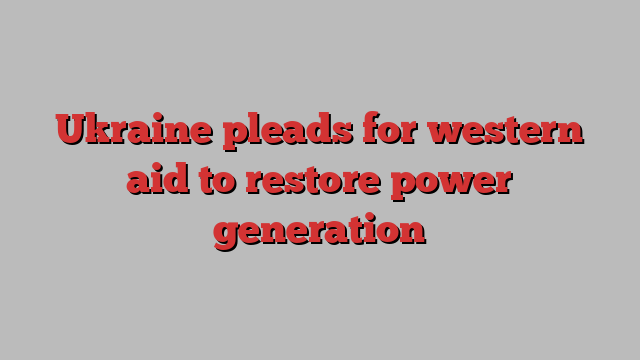
Ukrainian officials have called on western partners to provide billions in aid for their country’s battered energy sector, as Russian air strikes have forced power companies to impose nationwide rolling blackouts.
President Volodymyr Zelenskyy told a conference in Berlin on Tuesday that Ukraine had lost half of its electricity generating capacity as the result of the Russian attacks. Peak consumption last winter was 18 gigawatts, he said, but Russian strikes had destroyed 9GW.
Energy, he said, continued to be “one of [Russian President Vladimir] Putin’s main targets”.
The two-day conference, which its German hosts said was bringing together 2,000 people from politics, businesses and civil society, is aimed at drumming up support for projects to rebuild cities and infrastructure destroyed by Russia’s full-scale invasion of Ukraine.
Chancellor Olaf Scholz said the World Bank had estimated that rebuilding and modernising Ukraine would require investments of nearly $500bn over the next ten years.
But energy is the main focus. “It is trumping everything,” said Arvid Tuerkner, managing director for Ukraine at the European Bank for Reconstruction and Development (EBRD). “It always comes back to energy.”
Officials fear the waves of Russian missile and drone attacks on Ukrainian energy infrastructure since March mean residents of Kyiv and other cities are looking at the grim prospect of no power as temperatures drop below freezing later this year.
Recent strikes have also targeted pumping facilities for underground natural gas storage being used by EU customers.
“This winter will be the most difficult since the full-scale invasion started,” said Sergii Koretskyi, chief execution of oil and gas company Ukrnafta. “Everyone will face problems with the electricity supply. So we need to prepare for this right now.”
But the conference was overshadowed by dramatic personnel changes in Kyiv that have shaken the confidence of Ukraine’s western partners. This week saw the resignation of Mustafa Nayyem, the official overseeing wartime reconstruction and the fortification of Ukraine’s defences.
He said his agency was being systematically undermined by the government and that the prime minister had barred him from attending the Berlin conference. Ukraine’s minister for reconstruction Oleksandr Kubrakov was also dismissed in May.
One of the companies worst affected by the Russian bombardment is DTEK, Ukraine’s largest private energy provider, with 90 per cent of its thermal generation capacity damaged or destroyed since March.
“As of today we have only 460 megawatts out of 5,000MW previously,” chief executive Maxim Timchenko said in an interview.
He said the quickest way to solve the energy crisis was to expand Ukraine’s electricity import capacity, from about 1.7GW to 2.2-2.5GW. Authorities were already in talks with the European Network of Transmission System Operators for Electricity, ENTSO-E, on boosting imports.
But DTEK was also speaking to energy companies in neighbouring countries about buying up old, decommissioned transformers and generators that could be deployed quickly in Ukraine.
In addition, it was looking to buy new equipment such as open-cycle gas turbines from big suppliers like GE Vernova and talking to international donors about opening new credit lines for financing urgent repair work.
“We need to make progress on all four of these fronts to avert a disaster this winter,” Timchenko said.
But Russia’s relentless air bombardment was rendering much of the reconstruction effort futile. “On average it takes two-three months to restore a unit and it’s operational for just three weeks before the next strike,” he said.
“All these activities will be a complete waste of time and money without adequate air defence,” he said, echoing a common complaint from Ukrainian officials.
Timchenko also said private companies such as DTEK were often at a disadvantage because so much of donor support was focused on state-owned enterprises. “Our key message is — pay more attention to the private sector,” he said. He added that DTEK might have built up “at least 1GW of wind power capacity by now if we had access to capital”.
The attacks on energy infrastructure are having a knock-on effect on other industries. Sergii Koretskyi said power outages had affected electricity pumps used in oil production, leading to a 10 per cent decline in volumes since the bombardment began.
Ukrnafta has responded to the crisis by unveiling plans to itself develop 1GW of gas-fired power generation, with funds from the EBRD. These will be small and medium-sized combined-cycle power plants, which produce both heat and electricity. “Decentralisation is key — it will not be so easy for Russia to hit them,” Koretskyi said.
Those are part of a package of €300mn in additional EBRD funding for Ukraine’s energy companies unveiled last week. The money will go towards repairing power plants, constructing new ones and ensuring a stable electricity supply.
But some worry about how quickly Ukraine’s energy system can be patched together before winter sets in. “It’s hard to understand what new generating capacity can be installed,” said the EBRD’s Tuerkner. “It depends a lot on supply chains.”